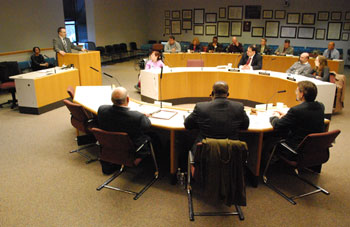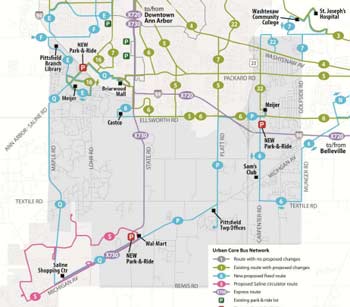Ann Arbor Transportation Authority board meeting (March 21, 2013): The board’s main business of the evening was a presentation from the audit firm Plante Moran on the result of AATA’s fiscal year 2012 audit.

David Helisek, at the podium, presented highlights of the audit report to the AATA board on March 21, 2013. (Photo by the writer.)
About the audit report, Plante Moran’s David Helisek told the board: “Hopefully, you found it somewhat boring.” By that he meant there were no material weaknesses or significant deficiencies to report. And his firm had struggled even to find suggestions for improvement in controls and processes. In the category of a suggestion was a recommendation to formalize a policy on user access to IT systems. And one question was left over from the previous year’s audit – on the legal basis of the AATA’s investment in heating oil futures as a hedge against possible price increases in diesel fuel. The AATA has inquired with the state of Michigan on that issue, but has not received an answer.
At the meeting, the board also rescinded a $119,980 contract it had authorized with PM Environmental – because of a failure on the AATA’s side to go through the standard procedure for bidding out the contract. The contract is for remediation of contaminated soil at the AATA’s headwaters on 2700 S. Industrial Highway. That contract will now be re-bid, and PM Environmental will have an opportunity to participate in that process.
In a final voting item on its agenda, the board authorized a four-month extension to the current pricing agreement the AATA has with Michigan Flyer – to provide AirRide service between downtown Ann Arbor and Detroit Metro airport. The extension will allow negotiations to take place on a new arrangement, which is being considered in the context of at least two factors. Ridership on the service, launched last year in April, has exceeded projections. And Michigan Flyer may be eligible for a federal grant that could increase the number of trips per day. The current service is hourly.
The board also heard a range of updates from its committees and CEO Michael Ford. Among the most significant was about a meeting scheduled for March 28 among representatives of Washtenaw County’s “urban core” communities that have, for the last few months, been engaged in discussions with AATA about expanded transit in a much smaller geographic footprint than the entire county. [Full Story]





